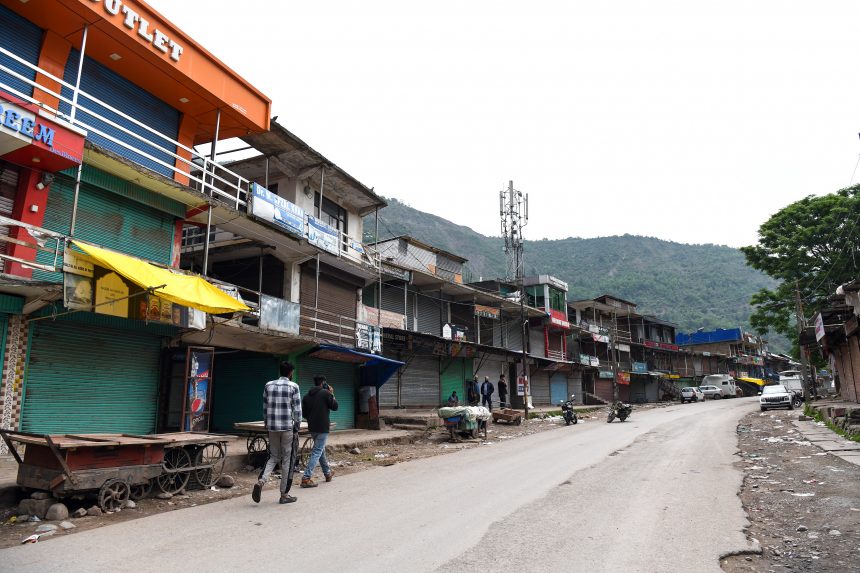After nearly a week of relentless hostilities, Jammu and Kashmir on Saturday night witnessed a fragile calm, with residents across the region experiencing their first peaceful night in six days, free from the terrifying sounds of aircraft, missiles, and drones piercing the skies.
Défense sources confirmed that no ceasefire violation was reported from any sector along the Line of Control (LoC) in Kashmir after 11 PM on Saturday.
The lull in firing extended across the Jammu region as well, including the worst-hit border districts of Poonch and Rajouri, offering a desperately needed respite to thousands who had been living under the shadow of war.
The relative calm followed an agreement between Indian and Pakistani military officials to observe a ceasefire along the LoC and International Border.
The Directors General of Military Operations (DGMOs) of both nations reportedly agreed to halt all forms of military engagement on land, air, and sea with effect from 5 PM on Saturday.
This decision came after intense cross-border violence that began after Operation Sindoor, launched by Indian forces in the aftermath of the deadly Pahalgam attack that claimed 26 civilian lives.
It was a targeted military response aimed at dismantling terrorist infrastructure across the Line of Control in Pakistan-occupied Kashmir. Described by officials as a “measured, non-escalatory, and proportionate” strike, the operation marked a significant escalation in cross-border military engagement.
In the days that followed a series of heavy retaliatory strikes, including drone incursions, shelling, and missile attacks from across the border, resulting in many civilian casualties, including five security personnel, and leaving dozens injured.
Even as the ceasefire took effect, officials reported sightings of drones over several parts of the Kashmir Valley on Saturday evening, raising concerns of ceasefire violations by Pakistan.
The return of calm was especially welcomed in border villages that had endured the brunt of the shelling. In Uri, Tangdhar, Gurez, Machil, Poonch, Rajouri, Jammu, Samba, Kathua and Nogam sectors, where hundreds of families had fled to safer ground, people slowly began returning home on Sunday morning.
Many of these homes bore visible scars of the violence walls shattered, roofs torn apart, and livestock lost.
In Kupwara and Bandipora districts, local officials said no fresh incidents of firing or shelling were reported through the night. In Gurez, residents who had taken shelter in government buildings and relatives’ homes were seen cautiously returning to assess the damage.
Srinagar city also witnessed a return to relative normalcy after a tense evening on Saturday. Sounds of distant explosions that had unsettled residents gave way to a rare silence by nightfall.
Streetlights, which had been switched off during earlier blackouts, remained on through the night.
In Udhampur district, which had experienced shelling shortly after the ceasefire was announced, also reported silence from late Saturday night onwards. Yet, an uneasy calm prevailed as many households kept their lights off voluntarily, unsure if the peace would last.
Throughout the week, a wave of panic had swept through both urban centers and rural areas, as air raid sirens blared and social media filled with images of destruction.
In several towns near the LoC, marketplaces were shuttered, public transport suspended, and emergency services overstretched.
On Sunday markets were opened in frontier towns of Uri in Baramulla, Poonch, Rajouri and other areas brought a sense of relief and tentative hope to thousands who had taken shelter in safer zones during the height of cross-border shelling.
Meanwhile the Jammu and Kashmir Police have issued a strict advisory urging displaced residents not to return home until their areas are officially declared safe.
The warning comes in the wake of heavy cross border shelling that left at least many dead and injured in the border district of Poonch and caused widespread destruction of homes and infrastructure along the LoC.
In Uri, one woman lost her life and over a dozen others were wounded, with many still undergoing treatment at the Baramulla district hospital.
A police spokesman said that police appeal all displaced residents to refrain from returning to your homes until official clearance is provided by the authorities.
“The recent cross-border hostilities have resulted in numerous damaged structures along the LoC and have tragically injured or killed many. More critically, the shelling has left numerous unexploded munitions scattered throughout private and public areas, presenting severe and life-threatening hazards to returning civilians,” he said.
The spokesman said J&K Police’s specialized Bomb Disposal Squad is actively conducting comprehensive sweeping operations to identify and safely neutralize all unexploded ordnance.
“These dangerous devices can remain active for extended periods and may detonate with minimal disturbance, posing extreme danger to untrained individuals,” he said.
The spokesman further said temporary shelter facilities have been established by District administration across the border districts with essential supplies and medical assistance.
“Please remain at these facilities until further notice. For emergencies, contact our 24-hour helpline at 112. Under current security provisions, unauthorized return to restricted areas is prohibited and may result in legal consequences.
“These measures exist solely for your protection. Security checkpoints have been established to prevent accidental entry into unsafe zones,” the spokesman said.
Meanwhile, residents are strongly advised to follow essential safety instructions if they encounter any unexploded ordnance.
“Under no circumstances should anyone touch, approach, or attempt to move any suspicious object, regardless of how harmless it might appear. Such devices can remain volatile and may detonate with minimal disturbance,” police said.
The spokesman further said if it is safe to do so, individuals are encouraged to mark the location from a distance to help warn others and guide bomb disposal teams to the site.
“It is crucial to report the sighting immediately by contacting emergency services at 112, providing accurate location details and any observations about the object,” he said.
The spokesman further said that residents should also alert others in the vicinity and ensure that everyone maintains a safe distance of at least 100 meters from the suspected device. These precautions are vital to prevent injury or loss of life.
“The estimated timeframe for clearing unexploded ordnance is a few days, depending on weather conditions and the extent of contamination in affected areas. The administration will issue official announcements regarding safe return through appropriate channels once clearance is complete,” he said.
The spokesman said they understand the hardship and inconvenience this situation has caused, and we thank you for your cooperation and patience during this challenging time.
Meanwhile thousands of residents from the border town of Uri had fled their homes following Pakistan’s retaliatory shelling after India’s launch of ‘Operation Sindoor’. Most took shelter in government-run relief camps.
MLA Uri Sajjad Shafi, told reporters that nearly half of the region’s 1.5 lakh population has been affected in some way whether through injury, destruction of property, or forced displacement.
“The scale of damage is massive, and our people are traumatised. They are eager to return, but safety must come first,” he said.








